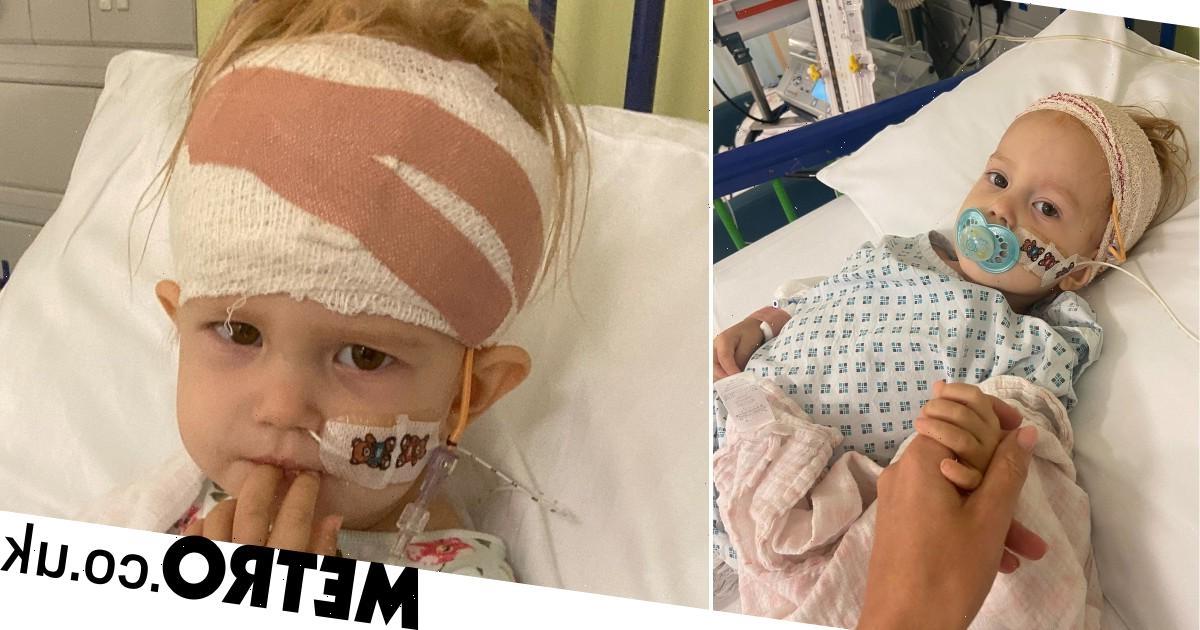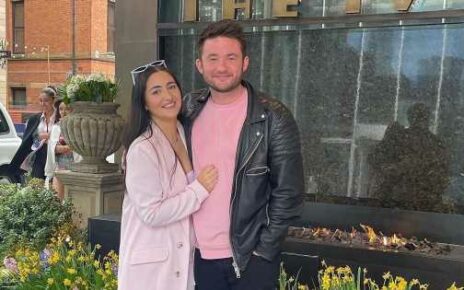
A two-year-old girl has a brain tumour so rare her parents have been told by specialists that they are unsure how best to treat her.
Little Orla Tuckwell’s brain tumour has left doctors at a loss for what to do, as they cannot find another case anywhere in Europe.
Orla was only 20 months old when her parents got the devastating news that she had medulloblastoma in September 2022.
Biopsy results revealed it also had an incredibly rare mutation, and since then, Orla has undergone four surgeries and gruelling chemotherapy.
Orla, who’s has spent most of the past six months in hospital, lives in Broxbourne, Hertfordshire with her mum Naomi, dad Adam, and older sisters Ava, eight, and Poppy, six.
Because she’s not old enough for radiotherapy, Orla’s parents were told that there will be no further treatment immediately available to Orla on the NHS once this course of chemo is done.





Naomi, 37, said: ‘It’s heartbreaking to see Orla so ill, battling over and over again.
‘Having to watch helplessly as your child is in agony and being given extra morphine to stop her screaming, or being administered toxic chemicals, will haunt me and Adam for the rest of our lives.
‘It’s far too much for a two-year-old to cope with, Orla should be playing and learning not having ovarian cryopreservation because all the chemo is making her infertile.
‘She is such a brave little fighter, but we’re constantly anxious about the future.’
Before the brain tumour was found, Orla was often violently vomiting for weeks
At first, doctors at the Princess Alexandra Hospital in Harlow thought she was having gut problems.
But the CT scan that found the tumour was only ordered when there was a change in her heart rate and blood pressure.
The tumour was successfully removed in surgery at the Great Ormond Street Hospital (GOSH), but in October results from the biopsy showed that the tot had a MYCN amplification in the tumour but didn’t have the TP53 mutation – things that are normally they are found together in cases like these.
Naomi said: ‘I asked the specialist “what does that even mean?” But they didn’t know. Our whole world came crashing down around us.


‘Orla’s consultant was working with other specialists to try to find out if anybody else in Europe has this tumour. They couldn’t find a single case.
‘The doctors don’t know if they are over or under-treating her with the current high-dose chemotherapy protocol, or if she might relapse.
‘That would be catastrophic and doesn’t bear thinking about, because after this round of chemotherapy, she would not be eligible for radiotherapy until the age of three.’
Now, Orla’s family is crowdfunding to raise money in case Orla ends up needing private treatment in the UK or further afield.
The money they hope to raise will also help with Orla’s rehabilitation after dealing with the severe side effects of her treatment.
These include reduced mobility and some loss of speech and hearing.


Naomi said: ‘It’s shocking how little is known about this disease, and how under-funded research into brain tumours is.
‘I wish we didn’t have to raise this money, it’s the last thing we want to be thinking about when our little girl is so ill.
‘Hopefully, we won’t need it, and it can be donated to fund research for future patients, but we need to be prepared.’
Orla’s family have decided to share her story during Brain Tumour Awareness Month, with Parliament even debating the current lack of funding for research for brain tumours on Thursday.
This is also mere days after All-Party Parliamentary Group on Brain Tumours (APPGBT)shared an Inquiry Report that dubbed the current funding system as unfit for purpose.
It detailed the fact that just £15 million of the £40 million promised for investment in brain tumour research in 2018 has made it to researchers.
Dr Karen Noble, Director of Policy, Research and Innovation at Brain Tumour Research, said: ‘We are so sorry to hear about Orla’s devastating plight. What a brave little girl she is, in such a desperate situation.
‘Despite the rarity of her tumour, her story is not unique. Brain tumours kill more children than leukaemia, yet historically just 1% of the national spend on cancer research has been allocated to this devastating disease.
‘There have been no new treatments developed and approved for use on brain tumours since 1999, and brain tumour patients deserve better.
‘This is why many people feel they are forced to raise tens, even hundreds of thousands of pounds to try treatments or trials privately or abroad.
‘Further research to find a cure needs to be a priority for the Government and cancer charities.
‘A recent Inquiry Report from the All-Party Parliamentary Group on Brain Tumours (APPGBT) called for just that, making strong recommendations that cannot be implemented soon enough.’
Do you have a story to share?
Get in touch by emailing [email protected].
Source: Read Full Article


